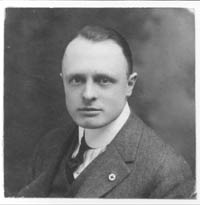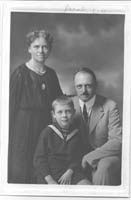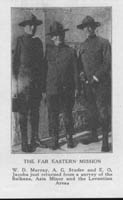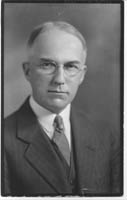Table of Contents
Key Figures
YMCA Secretaries
a | b | c | d | e | f | g | h | j | k | l | m | n-o | p | r | s | t-u | v | w | y-z
Ernst Otto Jacob (1886-1966)
Born in Dresden, Germany, Jacob served as a War Prisoners' Aid Secretary in Germany during World War I. In September 1910, Jacob became the first Traveling Secretary in the Levant (Turkey) in Constantinople for the Foreign Work Department of the International Committee of the American YMCA. Jacob became responsible for national planning and organization of the Association in Turkey. When YMCA work in the Ottoman Empire deteriorated as a result of the war, Jacob transferred to War Prisoners' Aid (WPA) service in Germany in June 1916 where he worked with Allied POW's in Saxony. He arranged a continuing education program for Allied college students in Saxon prison camps taught by faculty members from the University of Dresden. Jacob also developed an extensive handicraft program; working with Crown Princess Margaret of Sweden, prisoners could display and sell their work at handicraft expositions. In addition, Jacob made every effort to provide the neediest Russian and Serbian prisoners with food parcels from the WPA Office in Copenhagen. When the United States broke off diplomatic relations with Germany, Jacob left the empire in March 1917 and returned to the U.S. to conduct WPA work for German POW's at Fort Ogelthorpe, Georgia. After the war, he worked as a secretary for the Foreign Department of the International Committee in New York City. He returned to Turkey in 1919 to serve as a Field Secretary. Jacob transferred to Poland in 1925 to become the General Secretary of the Krakow Association and moved on to Greece in 1929. In 1933, Jacob returned to the United States to become the General Secretary of the Providence, Rhode Island YMCA, a position he held for two years. He then accepted the Executive Secretary position for the West Side Association in New York City. From 1945 to his retirement in 1947, Jacob was a member of the New York City Metropolitan Board.
Edward C. Jenkins (1875-1956)
The private secretary for John R. Mott for ten years, Jenkins became one of the American YMCA's most talented administrators. In 1913, the International Committee assigned Jenkins to supervise the Foreign Work division of the Association. Mott promoted Jenkins to serve as the executive of the Foreign Work department in 1917 and he used his administrative abilities to developed a salary scale for secretaries; stimulated the intellectual life of the field staff; established overseas projects; and won the respect of a number of foreign YMCA leaders. After the war, Jenkins planned a series of staff conferences and made an extended tour of India from 1921 to 1922. In 1925, Jenkins resigned from the International Committee to lead the George Williams College, an Association institution, in Chicago.
Henri Johannot
A Swiss citizen, Johannot volunteered to go to Bulgaria to assist in the development of the Association Movement during the Geneva Plenary Meeting in March 1906 (his major asset was that he spoke Bulgarian). His offer remained on the table while he served on the World's Alliance Boys' Work staff from 1912 to 1913. At the Eighteenth World's Conference of YMCA's at Edinburgh in June 1913, Johannot translated the address by Reverend D. N. Furnajieff, President of the Bulgarian Association. The World's Alliance decided to send Johannot as a full-time YMCA and World's Student Christian Federation Secretary to Bulgaria, which would serve as the basis for Association expansion in the Balkans. He began operations in the kingdom in January 1914 and helped expand the YMCA base during his eight month tenure. With the outbreak of World War I, Johannot had to return to Switzerland for military service. In 1923, Johannot became a secretary on the World's Committee. He became the Executive Secretary of the World Alliance's Commission on Labor Problems and focused on child employment. In July 1939, when the clouds of war gathered over Europe, the World's Alliance reestablished the War Prisoners' Aid program. Johannot became the Associate General Secretary of the WPA and ran the Geneva operations. This entailed the shipment of supplies to prison camps across Europe and North Africa. After the end of the war, Johannot provided relief services for released concentration camp victims. From 1945 to 1948, Johannot served as the Secretary for Leadership Training of the World's Alliance. He retired from YMCA service in 1948.
Hans O. Juhl
A Danish YMCA secretary, Juhl volunteered to become a World's Alliance War Prisoners Aid Secretary in Germany in November 1917. He worked in Hannover, serving the prison camps in the VII Army Corps region, based in Münster. Juhl was one of the replacements for the American WPA Secretaries who left the Reich in February 1917.



